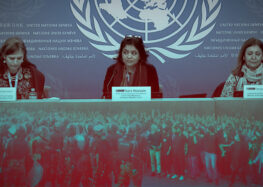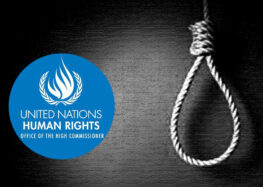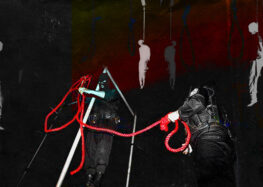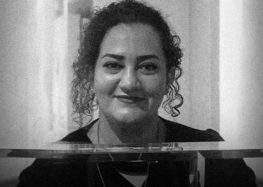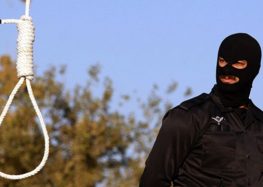Iranian-Canadian on Death Row Faced Torture and Unfair Trial
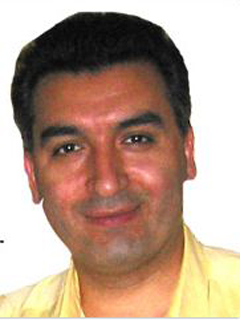 Hamid Ghassemi-Shall an Iranian and Canadian citizen, was arrested on 24 May 2008, and eventually charged with espionage and contact with the Mojahedin-e Khalgh Organization. Ghassemi-Shall spent 18 months in solitary confinement. For the first eight months of his detention he had no access to his family or lawyer. Ghassemi-Shall’s wife, Antonella Mega, told the International Campaign for Human Rights in Iran that her husband was tortured while in detainment.
Hamid Ghassemi-Shall an Iranian and Canadian citizen, was arrested on 24 May 2008, and eventually charged with espionage and contact with the Mojahedin-e Khalgh Organization. Ghassemi-Shall spent 18 months in solitary confinement. For the first eight months of his detention he had no access to his family or lawyer. Ghassemi-Shall’s wife, Antonella Mega, told the International Campaign for Human Rights in Iran that her husband was tortured while in detainment.
“In my last conversation with my husband Hamid, a few days ago he indicated he had been subjected to torture. When I asked him what kind of torture he responded that he couldn’t talk. But when I asked him if they beat him, he said ‘yes’ and when asked where, he said ‘all over my body, face, legs, stomach, back.’ I asked him if he bled, he said yes, and then said ‘physical wounds heal, but the psychological torture will remain for the rest of my life.’
In the summer of 2009, Branch 29 of Revolutionary Courts convicted Ghassemi-Shall and sentenced him to death. Iran’s Supreme Court upheld the conviction and sentence in November 2009 and the Amnesty Commission rejected Ghassemi-Shall amnesty appeal. Ghassemi-Shall’s sister details to the Campaign how her brother was detained incommunicado, deprived adequate legal representation, and denyied the right to present a defense.
Ghassemi-Shall’s brother, Alborz Ghassemi-Shall, an Iranian national and navel officer, was also arrested and died in prison before the trial on 19 May 2010 .
What follows is a transcript of the International Campaign for Human Rights in Iran’s 4 March 2011 interview with the sister of Hamid and Alborz Ghassemi-Shall.
When were they arrested?
Alborz was arrested on 12 May 2008. Hamid was in Iran, beginning on 7 May that year, to visit the family. Alborz had requested a passport. [Armed forces personnel do not apply for passports through regular Passport Office channels. They have to apply through the Army.] He received a call from the Army Counter Intelligence Unit and they told him that his passport was ready for pickup. When he went there he was arrested. Hamid was arrested on 24 May 2008.
Where were they taken?
We don’t know where they were taken. A year and a half after their arrests, they were transferred to Evin Prison and we saw them there. During the time before their transfer to Evin, we could visit with them every 4 or 5 months inside the Army Joint Command. Both of them were in solitary confinement for 18 months and 10 days. They spent some of this time at Evin Prison.
After your brothers were arrested, when was the first time you were able to gain information about them and go to see them?
Their first court session was eight months after their arrests. I saw them there. That’s when we learned what their charges were. They themselves only found out then about their charges.
What were the charges against your brothers?
Both my brothers were charged with “espionage,” and “moharebeh” (enmity with God), through contact with Mojahedin-e Khalgh Organization (MEK). This organization is nothing. I don’t understand why they pump it up like this.
Regarding the charge of contact with the MEK, on what basis was this charge waged against your brother?
Look, the “evidence” in my two brothers’ file, which has been referred to [in court], is an A4 sheet of paper, which on it, they say, is written [as an email] that Hamid, who lived in Canada at the time, is requesting information from Alborz, who lived in Iran. The sheet of paper doesn’t even have the appearance of an email. I mean the name of the sender, the receiver, the date, the time, none of that is shown on the piece of paper. It’s just an A4 piece of paper on which an email address is written in big letters. There are errors in the email address. There is no way a person can send an email with even one of the errors in that email address. I am a simple [internet] user, and I was able to find at least 15 things wrong on this “evidence.”
Were you able to invite experts to court, to give their opinions about the authenticity of this document?
The lawyer asked again and again that the court allow a computer expert to evaluate the document and to state his official opinion of it, but he was never allowed to do this. We even hired an expert to state his opinion, but because our expert did not have a license from the Judiciary, even though we submitted the expert’s opinion, they did not accept it.
Could you say a few words about the trial?
The trial lasted only a few minutes and my brother wasn’t even allowed to fully speak [on his own behalf]. In fact, when someone enters the court room after eight months in solitary confinement, and he has not seen anyone for eight months, and hasn’t talked to anyone—I mean he was interrogated during the first six months but after that he had not seen anyone for two complete months—when he enters the court abruptly, he would not have sufficient concentration to answer questions. Hamid was disoriented at that court session; he was dazed; he didn’t know what he was doing. He kept saying: “Where is this? Why did they bring us here?” He was lost. Later, he said “that day, when you were saying those things, there was a strange buzz in my head, because I had been in complete silence before.” And really, this was not a fair court in which they could defend themselves.
When this court tried and sentenced them to death, the case was sent to an appeals court. The appeals court announced itself disqualified to review the case, and forwarded the case to the Supreme Court. The Supreme Court upheld the lower court’s ruling and issued death sentences for both of them.
Did they have access to their lawyer?
Only their first lawyer was allowed to see them for one hour before the death sentence was issued.
Was the lawyer able to defend your brother in Supreme Court and present a defense?
Yes. My brother’s case is full of contradictory claims. If my brother was a spy, why would he go to the Intelligence Unit of the Armed forces ten days after the arrest of our older brother to find out about him, without having a getaway plan for himself?
The Supreme Court wrote in the indictment that Hamid tried to send $35,000 for Alborz through Bank Melli Iran, and the Bank did not accept the transfer. It is not clear why the bank would not accept the transfer? Or why would my brother try to send my other brother this money? There are so many problems like this in this indictment. As a layperson without any legal background, I can name many of these problems. My brother is innocent.
Why do you think this case was waged against your older brother, implicating your younger brother in the process?
I only believe that some kind of personal animosity with Alborz may have been at work. I mean Alborz received numerous commendation letters from the IRGC, Navy, the Army, and his commanders. Copies of all these commendation documents are attached to his case file. A man with such a glowing record—what would be the reason for him to do such things? My brother wrote 25 technical books, in addition to the volumes of books he translated.
What is the latest news about the case?
The case was referred to the Amnesty Commission, with the request of “one degree of discount” on his verdict, but the Commission denied the request. My brother was supposed to have been executed last Wednesday. God’s kindness saved us and the execution orders were suspended. God helped us. They want to re-submit the case to the Amnesty Commission again.
Did your brother Alborz suffer from any particular illness before going to prison?
No. My brother had no illness and he was very healthy. All the people who were inside Ward 350 with him can attest that he had no illness and was completely healthy.
What do you think was the cause of his death?
I don’t know. Both my brothers were taken to the Counter Intelligence Unit to have them sign letters. When they returned, he had stomach bleeding. He died a week later.
Do you have anything you want to ad?
I would like to ask the people of the world, the authorities of Iran, for this case to be reviewed again. There are so many contradictions in this case, and there is no reason to support that Hamid has committed a crime. I say this emphatically and strongly and I beg—my brothers were not and are not political. They did not belong to any group. They were ordinary citizens, respectful of the laws of their country, leading normal lives.


